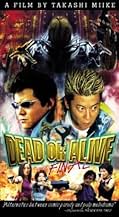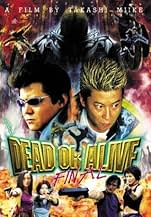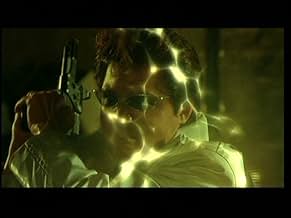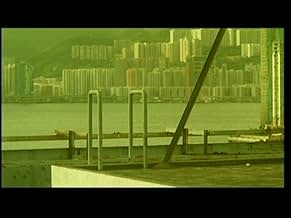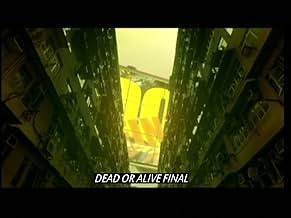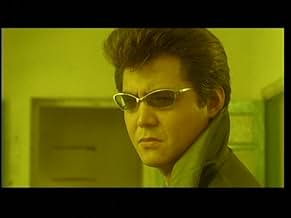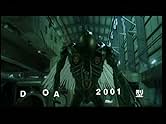IMDb RATING
5.6/10
2.9K
YOUR RATING
The ace cop of a totalitarian police force and a drifting android play their parts in a post-apocalyptic society. They are destined to fight. Their encounter will change them forever.The ace cop of a totalitarian police force and a drifting android play their parts in a post-apocalyptic society. They are destined to fight. Their encounter will change them forever.The ace cop of a totalitarian police force and a drifting android play their parts in a post-apocalyptic society. They are destined to fight. Their encounter will change them forever.
- Director
- Writers
- Stars
William Wai-Lun Duen
- Gangster
- (as William Duan)
Wai-Kwong Lo
- Gangster
- (as Kenneth Low)
Don Thai Theerathada
- Don
- (as Donald Panutat)
- Director
- Writers
- All cast & crew
- Production, box office & more at IMDbPro
Featured reviews
Out of the three in the trilogy, I'd say this is the second strongest. It starts with some very amazing action, but goes downhill from there. Thematically it's similar to the previous films, but the story and point of the movie get muddled somewhere along the way. The ending is quite nuts, and reminded me of TETSUO. By the way, did you know that the director of TETSUO played Ichi's father figure in Ichi The Killer?
While Miike Takashi has not written any of the films he has directed, his style and formula (or lack thereof) has made him a force to be reckoned with in modern filmmaking. He takes the most mundane of stories and scenarios and gives it a fresh jolt of adrenaline and emotion, making his films seem as fresh and as original as anything by David Lynch or Stanley Kubrick. "Dead or Alive: Hanzaisha" was about a cop and a criminal struggling against each other and ultimately destroying both their families and themselves. "Dead or Alive 2: Tôbôsha" was about two hitmen rediscovering their innocence only to lose it again and ultimately destroy themselves. Now we have "Dead or Alive: Final," the third and final installment in a trilogy of films that are unrelated to each other...and yet they've all got something in common besides the director and the two main actors.
"Dead or Alive: Final" plunges us into Yokohama of 2346, where a homosexual mayor has outlawed human breeding and keep srigid control through use of birth control pills and his chief enforcer, Officer Honda (Takeuchi Riki). Standing in the mayor's way is a group of rebels, led by Fong (Terence Yin) and Jun (Josie Ho), who now have a new ally, a "replicant" by the name of Ryo (Aikawa Sho, still sporting his cool blond hair). Immediately, the "Blade Runner" references run rampant, right down to the terminology. The use of the word "replicant" to describe Ryo, the omnipresent floating blimp with the huge TV screens flashing advertisements, the decrepit rain-swept environment of a ravaged city, even the characters themselves, all homages to "Blade Runner." Oh but there are other sci-fi nods too. Elements of "THX-1138," "The Matrix," "The Terminator," etc...it's all there, making "Dead or Alive: Final" almost a satire (and sometimes a parody) of sci-fi cinema.
There's more than just the humorous nod to sci-fi going on. Yet again, Miike has given us a few thrills via his "Don't expect anything" style. While there is nothing truly shocking in this film compared to its predecessors (save for the ending), there is still the nod to Kitano's films (i.e. beautiful scenery, long shots of characters, and even a few beach scenes). But while Kitano is poetic, Miike is like a jackhammer, hitting you full-on in the face with his own brand of filmmaking. The story is nothing new, and even the characters are easily understood and familiar, but there is something about Miike's gritty take on the conventions of genres and cinema that gives it an originality. Who else but Miike could make three completely different and unrelated films and tie them all together into a package that is both confusing and cohesive? Okay, so the ending still threw me for a loop, but it was typical of Miike.
In the end, we are left with many of the same themes...the predominant one being that some people just never quit, and in the end it will destroy them. Honda's son is kidnapped, and even after he is returned, he is still hellbent on stopping the rebels. Ryo could easily back out of the fight and go on with his life, but he can't. The evil dictator could easily allow people to live their lives as they see fit, but he refuses to relent. Even a scene where a rebel is given the choice to either die or take the birth control drug, he decides to die for a cause that is pretty much lost. In all three "Dead or Alive" movies, nobody quits...and as a result everybody dies. The people who do know when to back down are the ones who survive. Ryo and Honda can't quit...and in the end, they meet for their final showdown, which resonates their endings in the previous two films. The tie in is not as neat as it could have been, but again, it's typical of Miike to give us something we really would not have expected, and at the same time that it's shocking, it makes a strange kind of sense. "Dead or Alive: Final" ties in all three movies, but not in the way that you might think. It yet again presents the same themes but from a completely different angle. It's like telling the same story...but not the same story. The idea is the same, but the details are different. There is the essence of the "Dead or Alive" films, and is probably the essence of Miike's films. They're nothing new...and yet, they are. It's not for everybody, but it's certainly different.
"Dead or Alive: Final" plunges us into Yokohama of 2346, where a homosexual mayor has outlawed human breeding and keep srigid control through use of birth control pills and his chief enforcer, Officer Honda (Takeuchi Riki). Standing in the mayor's way is a group of rebels, led by Fong (Terence Yin) and Jun (Josie Ho), who now have a new ally, a "replicant" by the name of Ryo (Aikawa Sho, still sporting his cool blond hair). Immediately, the "Blade Runner" references run rampant, right down to the terminology. The use of the word "replicant" to describe Ryo, the omnipresent floating blimp with the huge TV screens flashing advertisements, the decrepit rain-swept environment of a ravaged city, even the characters themselves, all homages to "Blade Runner." Oh but there are other sci-fi nods too. Elements of "THX-1138," "The Matrix," "The Terminator," etc...it's all there, making "Dead or Alive: Final" almost a satire (and sometimes a parody) of sci-fi cinema.
There's more than just the humorous nod to sci-fi going on. Yet again, Miike has given us a few thrills via his "Don't expect anything" style. While there is nothing truly shocking in this film compared to its predecessors (save for the ending), there is still the nod to Kitano's films (i.e. beautiful scenery, long shots of characters, and even a few beach scenes). But while Kitano is poetic, Miike is like a jackhammer, hitting you full-on in the face with his own brand of filmmaking. The story is nothing new, and even the characters are easily understood and familiar, but there is something about Miike's gritty take on the conventions of genres and cinema that gives it an originality. Who else but Miike could make three completely different and unrelated films and tie them all together into a package that is both confusing and cohesive? Okay, so the ending still threw me for a loop, but it was typical of Miike.
In the end, we are left with many of the same themes...the predominant one being that some people just never quit, and in the end it will destroy them. Honda's son is kidnapped, and even after he is returned, he is still hellbent on stopping the rebels. Ryo could easily back out of the fight and go on with his life, but he can't. The evil dictator could easily allow people to live their lives as they see fit, but he refuses to relent. Even a scene where a rebel is given the choice to either die or take the birth control drug, he decides to die for a cause that is pretty much lost. In all three "Dead or Alive" movies, nobody quits...and as a result everybody dies. The people who do know when to back down are the ones who survive. Ryo and Honda can't quit...and in the end, they meet for their final showdown, which resonates their endings in the previous two films. The tie in is not as neat as it could have been, but again, it's typical of Miike to give us something we really would not have expected, and at the same time that it's shocking, it makes a strange kind of sense. "Dead or Alive: Final" ties in all three movies, but not in the way that you might think. It yet again presents the same themes but from a completely different angle. It's like telling the same story...but not the same story. The idea is the same, but the details are different. There is the essence of the "Dead or Alive" films, and is probably the essence of Miike's films. They're nothing new...and yet, they are. It's not for everybody, but it's certainly different.
The final installment sees Sho Aikawa and Riki Takeuchi (looking cooler than ever in his reversible overcoat!) pitched against each other for one last battle, this time in the future. The plot owes a lot to Blade Runner, but done in Takashi Miike's low budget, frenetic, comic style. I did feel that it was the weakest of the three DOA films, and although the ending was still outrageous, it lacked the shock value of the previous two. Compared to the likes of Ichi the Killer and Visitor Q, DOA:Final is nowhere near as extreme, but is faithful to the other two films in the trilogy. That said, fans of the first two (and fans of Miike) will get a lot from this as it ties all three films together and gives a final explanation of the relationship between the two protagonists.
OK, this doesn't compare to the explosive tempo of the first part's opening sequence; nor to its visual shock value; nor, for that matter, to the melancholic suspense of the second installment. No, it's surprisingly and refreshingly different (apart, of course, from the two main actors). The tongue-in-cheek futuristic scenario drives the characters towards each other across genres and languages with an almost gravitational force. The moment of impact-conclusion is your choice of: a)Shakespearean metaphor of life and humanity in a cartoon costume; b)sublimation of violence into homo-erotics; c)humorous detonation of an impossible buildup. Everything up to then is even less unequivocal.
Highly recommended to indiscriminate movie buffs who don't mind following foie gras with a hot dog; caution to those with more refined palates.
Highly recommended to indiscriminate movie buffs who don't mind following foie gras with a hot dog; caution to those with more refined palates.
I'm so honored to see I'm one of the 3 women who have rated DOA: Final on the IMDb that I feel compelled to comment. Look, Ma, I'm an arcane-trash-cinema hound! Yippee!
Right. Having seen all three DOA films in one evening at a triple-feature (this is what happens when you live in a small French city and only one cinema in town shows subtitled films), I'm in a terrific mood, because the movies were tons of fun. More fun than I'd been expecting, because Miike films seem to come accompanied with user comments like "Don't bring a girl to this." Thanks, guys. Anyway, DOA: Final is, sadly, easily the weakest of the trilogy. After DOA 1, which is a nutso, gutsy genre-jumping yakuza tale, and DOA 2, which pretends to be a yakuza tale for ten minutes and then turns into a Wim Wenders film (and a good one too), this last entry apparently wants to be science fiction. But, alas, it just can't cut the mustard.
Sho Aikawa is the bright point -- as effortlessly, unclassifiably entertaining here as he is in the first two DOAs. With his bad bleach job, crackily teenage voice, tracksuit and sneakers, and zen spaciness, he's as counterintuitive and appealing as you'd expect in his role as a battle cyborg, or "replicant," named Ryo. If I could just watch him hang out with nine-year-olds for two hours, that might be worth the admission price. But even a blond Sho Aikawa is no Rutger Hauer, and he can't make this film work.
The SF premise is of the most worn-out sort -- an authority figure is making people take anti-fertility drugs to stop them having children. Oh, no! The all-business, authoritarian hand of the state is placed in opposition to the natural world of human instinct, family bonds and lush jungle backdrops! That's enough to make a sci-fi movie, right? Throwing in a band of sex-friendly "rebels" doesn't help: Terence Yin and Maria Chen seem to have been cast more for their attractively Eurasian features and ability to look good in camos than for their acting talent. Admittedly, it's a tough trick to shuttle between three languages, but Yin's "acting" in English is just wince-worthy, and Chen isn't convincing even when she doesn't speak.
The pompadoured Riki Takeuchi is fun, as always, here in the role of a police chief caught in a moral dilemma about whether to enforce his boss's orders. But returning to that SF premise, we have the problem of an unaddressed: WHY? What's the motivating engine behind all this evil-drug, Mad-Max-type-rebellion, anti-family stuff? Miike's very hand-wavy about this -- "It's an overpopulation thing" -- but, and this is the bad part, he's none too subtle about suggesting the bad-guy mayor's obvious homosexuality has a lot to do with it. Thanks, Takashi Miike! I guess homosexuals really are the ultimate threat to the survival of humanity, huh? I mean, come on, this crap went out with "Dune." Watch Miike associate homosexuality with pedophilia, decadence, pastel scarves and -- a sign of true evil -- saxophone concerts, in order to see why this movie has to get a three-point deduction for catastrophic moronicity.
This is the only one of the three DOA films I wouldn't see again. It's not without its bright spots, but there are far too many negatives to make it hold together. In the little quality meter in my head, I was rating it as low as a 4/10, right up until the final five minutes. Then I started laughing my head off. The bizarreness of Miike's wrap-up pushes the whole experience up to a 5/10. But, you know, if an out-of-left-field conclusion improves the filmic experience, you can be pretty sure there's something wrong with the movie to begin with. Unfortunately, in this case there's quite a lot.
Right. Having seen all three DOA films in one evening at a triple-feature (this is what happens when you live in a small French city and only one cinema in town shows subtitled films), I'm in a terrific mood, because the movies were tons of fun. More fun than I'd been expecting, because Miike films seem to come accompanied with user comments like "Don't bring a girl to this." Thanks, guys. Anyway, DOA: Final is, sadly, easily the weakest of the trilogy. After DOA 1, which is a nutso, gutsy genre-jumping yakuza tale, and DOA 2, which pretends to be a yakuza tale for ten minutes and then turns into a Wim Wenders film (and a good one too), this last entry apparently wants to be science fiction. But, alas, it just can't cut the mustard.
Sho Aikawa is the bright point -- as effortlessly, unclassifiably entertaining here as he is in the first two DOAs. With his bad bleach job, crackily teenage voice, tracksuit and sneakers, and zen spaciness, he's as counterintuitive and appealing as you'd expect in his role as a battle cyborg, or "replicant," named Ryo. If I could just watch him hang out with nine-year-olds for two hours, that might be worth the admission price. But even a blond Sho Aikawa is no Rutger Hauer, and he can't make this film work.
The SF premise is of the most worn-out sort -- an authority figure is making people take anti-fertility drugs to stop them having children. Oh, no! The all-business, authoritarian hand of the state is placed in opposition to the natural world of human instinct, family bonds and lush jungle backdrops! That's enough to make a sci-fi movie, right? Throwing in a band of sex-friendly "rebels" doesn't help: Terence Yin and Maria Chen seem to have been cast more for their attractively Eurasian features and ability to look good in camos than for their acting talent. Admittedly, it's a tough trick to shuttle between three languages, but Yin's "acting" in English is just wince-worthy, and Chen isn't convincing even when she doesn't speak.
The pompadoured Riki Takeuchi is fun, as always, here in the role of a police chief caught in a moral dilemma about whether to enforce his boss's orders. But returning to that SF premise, we have the problem of an unaddressed: WHY? What's the motivating engine behind all this evil-drug, Mad-Max-type-rebellion, anti-family stuff? Miike's very hand-wavy about this -- "It's an overpopulation thing" -- but, and this is the bad part, he's none too subtle about suggesting the bad-guy mayor's obvious homosexuality has a lot to do with it. Thanks, Takashi Miike! I guess homosexuals really are the ultimate threat to the survival of humanity, huh? I mean, come on, this crap went out with "Dune." Watch Miike associate homosexuality with pedophilia, decadence, pastel scarves and -- a sign of true evil -- saxophone concerts, in order to see why this movie has to get a three-point deduction for catastrophic moronicity.
This is the only one of the three DOA films I wouldn't see again. It's not without its bright spots, but there are far too many negatives to make it hold together. In the little quality meter in my head, I was rating it as low as a 4/10, right up until the final five minutes. Then I started laughing my head off. The bizarreness of Miike's wrap-up pushes the whole experience up to a 5/10. But, you know, if an out-of-left-field conclusion improves the filmic experience, you can be pretty sure there's something wrong with the movie to begin with. Unfortunately, in this case there's quite a lot.
Did you know
- ConnectionsEdited from Dead or Alive (1999)
Details
- Release date
- Country of origin
- Official site
- Languages
- Also known as
- Dead or Alive III
- Filming locations
- Production companies
- See more company credits at IMDbPro
Box office
- Gross US & Canada
- $2,591
- Opening weekend US & Canada
- $1,841
- Dec 1, 2002
- Gross worldwide
- $2,591
Contribute to this page
Suggest an edit or add missing content



